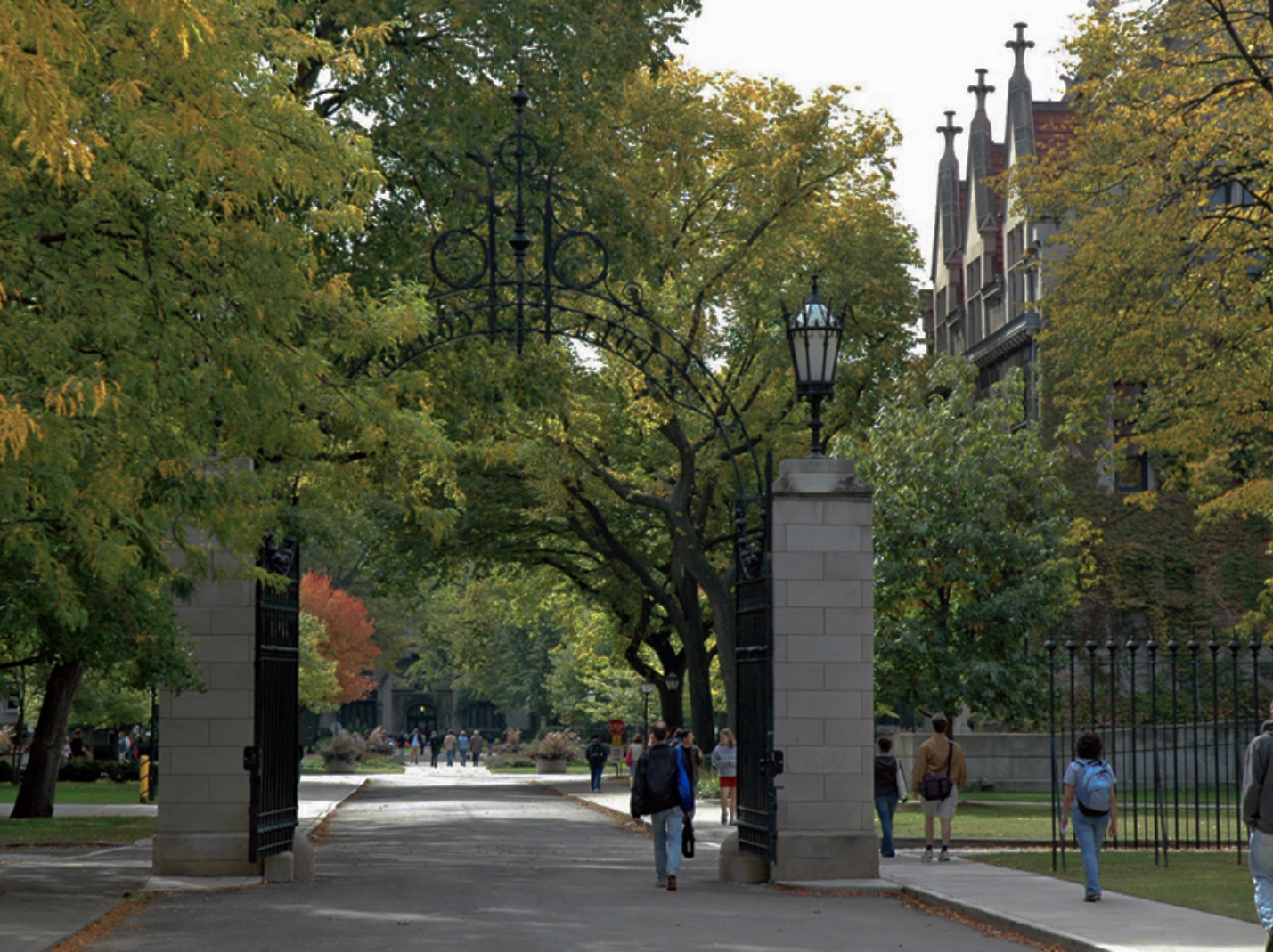
On September 2, Higher Ed Dive reported that the University of Chicago (UChicago) is embarking on a $100 million cost-cutting plan. The plan includes laying off up to 150 members of its staff and freezing admissions to 19 doctoral programs in the 2026–27 academic year—almost all of which are in the liberal arts and humanities, including anthropology, political economy, English, theater, art history, and public policy. The university will also abandon its practice of financing new buildings through debt, turning instead to philanthropy and outside backers.
Deflecting any blame, University President Paul Alivisatos stated that policy changes under the Trump administration had “created multiple and significant new uncertainties and strong downward pressure on our finances.”
But pinning the university’s financial struggles on the Trump administration is simply specious. Clifford Ando, a Robert O. Anderson Distinguished Service Professor of Classics and History at UChicago, argues in a recent essay for Compact that the university’s financial strain stems from decades of self-destructive choices. Under successive administrations, UChicago has reduced doctoral programs, minimized faculty contact with students, and increasingly relied on underpaid lecturers instead of professors. Entire departments face consolidation or closure; students are sometimes sent online—or even to other universities—to take courses. And, most absurdly, Ando says, certain languages may soon be taught by ChatGPT.
Debt is central to UChicago’s crisis.
The university has borrowed more aggressively than any of its peers—“$6.3 billion, more than 70 percent of the value of its endowment,” Ando says. Servicing this debt now consumes nearly all undergraduate tuition revenue, diverting funds away from classrooms and faculty salaries. To mitigate these pressures, the university expanded its undergraduate population without hiring additional tenure-track faculty. Because of this decision, students will be in larger classes, have fewer interactions with professors, and be taught by poorly compensated lecturers. By the university’s own calculations, Ando says, this approach allows it to divert the majority of tuition income to purposes other than teaching—I’d wager a good chunk is lining the pockets of campus bureaucrats who add little to learning but pull in more than any teacher.
[RELATED: The Chicago Principles Took a Sick Day at UChicago’s Anti-Semitism Roundtable]
This spiral reflects a deliberate set of priorities rather than mere misfortune, Ando argues.
He goes on: since the Bayh-Dole Act of 1980 enabled universities to retain patents on federally funded research, institutions like UChicago have pursued profits through applied science—developing patents and investing hundreds of millions in new labs and technology centers. The results have often been underwhelming, however.
Ando points to UChicago’s computer science department, which, he says, despite heavy investment, has fallen in national rankings:
If one plots the trajectory of spending on computer science at the University of Chicago in the decade leading up to 2011, and then counts up the additional spending on buildings, materiel, and operational costs through 2024, the total comes to hundreds of millions of dollars. During that time, despite that additional investment, the ranking of the university in computer science has declined from 40th to 56th.
If that didn’t already raise eyebrows, UChicago has been directly funding faculty-led start-ups through its Startup Investment Program, which sets aside $25 million from the endowment for early-stage ventures. On one of it’s website, the university boast startups such as Flow Medical, founded by Jonathan Paul, associate professor of medicine, and Osmanuddin Ahmed, associate professor of radiology, developing a next-generation therapy for pulmonary embolism; SimCare AI, founded by former UChicago students, creating AI-driven platforms for clinical skills training; and Beacon, founded by Brian Clark, MBA ’17, designing technology to eliminate pathogens from air and surfaces.
Albeit some of these startups sound promising, but Ando notes that many of the university-backed ventures fail. And by investing in them, UChicago creates conflicts of interest. As he asks, how can the institution fairly evaluate a faculty member when it has a financial stake in his commercial projects? Questions also arise about the source of these funds—tuition, unrestricted endowment dollars, or outside investors. By prioritizing high-risk investments over undergraduate instruction, UChicago operates less like a university and more like a tax-exempt venture incubator, calling its charitable status into question.
[RELATED: More Decline in the U. of Chicago Core]
Ultimately, then, Trump bears little responsibility, if any, for the University of Chicago’s current predicaments. The real culprits are the university’s own choices—ballooning debt, tuition diversion, and the pursuit of revenue over teaching. And to be sure, Alivisatos’s attempt to pin the turmoil on recent policy shifts ignores easily Googleable facts, such as that in fiscal year 2024—before Trump took office—UChicago ran a $193.7 million operating deficit, even as revenues continued to climb.
A more fundamental point, however, is that the university’s choices have eroded the very meaning of education. No longer understood as a public good—a collaborative enterprise among scholars—UChicago treats itself as little more than a credential mill. Administrators, chasing revenue growth—and let’s not forget social-justice branding—have raised tuition while cutting corners on teaching. In doing so, they’ve not only delivered a subpar education at a higher cost, but they’ve also reinforced the notion that education exists solely for the lifetime earnings it can generate. Lost in this utilitarian calculus is the older purpose of education: to cultivate citizens capable of sustaining a republic. After all, the programs it has chosen to cut are precisely those that shape civic life and transmit the cultural inheritance of the West. A society that watches a university—UChicago, no less—abandon this cornerstone of its mission and recast itself as a mere economic opportunity zone should not be surprised when civic life collapses. That collapse is only hastened by the fact that students, lured by the promise of lucrative careers, discover too late that they have not only failed to receive a prestigious education, but that their prestigious, marketable degrees lead to underemployment.
With this, perhaps the only part of the university’s mission still left to boast is its “Chicago Principles.” According to Keith Whitaker, a National Association of Scholars board member and graduate of UChicago’s Committee on Social Thought, the principles have provided “some comfort to those of us who care about unbiased scholarship, teaching, and learning.” But this comfort is thin. The principles, for example, have already taken sick days in the face of anti-Semitism, and, Whitaker argues, they are a tool, not the purpose. “What matters free speech when the university has died?”
Even with revenues exceeding $3 billion, Ando contends that UChicago could maintain its historic commitment to rigorous inquiry across the sciences and humanities. Instead, doctoral programs are being dismantled, undergraduates lose meaningful contact with faculty, and the curriculum is narrowed to what is fashionable, fundable, or profitable.
As Ando says, UChicago is “simply choosing not to be a university.”
Follow Jared Gould on X.
Image: “UChicago gate” by Rdsmith4 on Wikimedia Commons

U Chicago has been on a downward trajectory, perhaps for nearly a century. Not all of it is their fault, much is. Paul Alivisatos is certainly not responsible for everything. He was brought in only in 2021 from Berekeley, where he was head of the Lawrence Berkeley Lab. It is also true that not all of U Chicago’s troubles can be lain at Trump’s foot. (Though the accusation that Trump is in the process of destroying American science supremacy is completely warranted.)
It is hard to fathom how U Chi has been so badly led. Their finances were deteriorating at least 50 years ago, when Northwestern (which now has its own major problems) started to pull ahead of Chicago’s endowment. There was a time when I believe there were 5 Nobel prize winners, 3 in physics, 1 in chemistry, and 1 in medicine/physiology. All I believe earned for work there. Those days are long gone, I’m afraid.
Knowledge of Chicago’s financial mismanagement of recent years has been know widely known, partly because of Ando’s writings.
What is wrong with the trustees at Chicago? But then, what is wrong with Chicago, the city, the metropolis? How did the presidents at Chicago, cumulatively, do so badly?
What was wrong with the folk running the Pennsylvania and New York Central Railroads?
The whole thing was going downhill fast even before the merger.
“they’ve also reinforced the notion that education exists solely for the lifetime earnings it can generate”
Except that one’s lifetime has to be over before one’s lifetime earnings becomes known.
What I’ve been saying for 30 years is now starting to become apparent now, that it was the people who went to college in the ’50s & ’60s who really benefited economically from college, with a rapidly declining ROI for those who graduated after 1985.